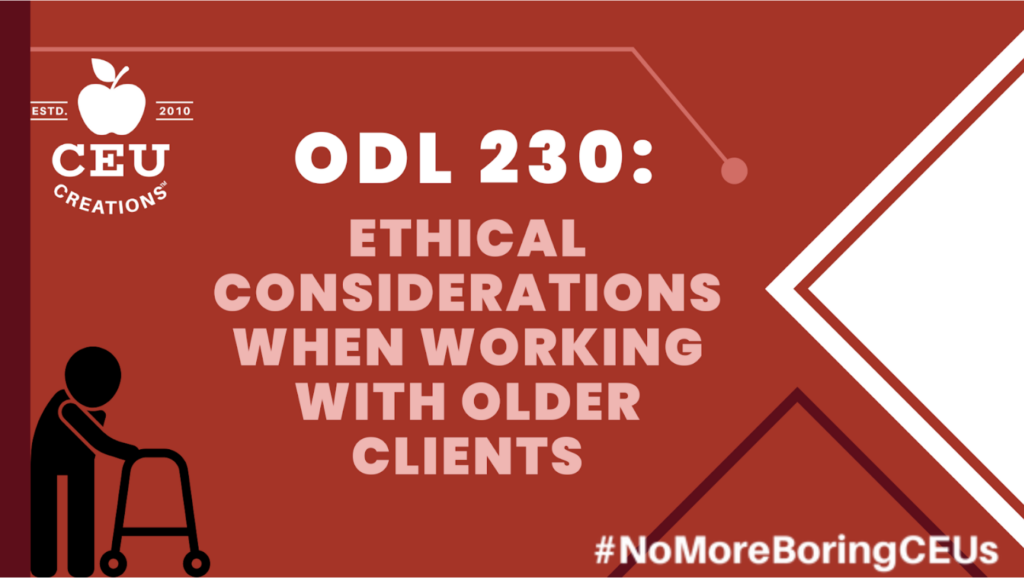On-Demand CE Training
ODL 230: Ethical Considerations when Working with Older Clients

Created on 02/01/2023 Revised on: 9/27/24
Attention New Jersey Social Workers:
This course is approved for all social workers, including New Jersey. The Board Adopted Amendments: N.J.A.C. 13:44G-6.3, 6.4, and 6.7 Content Areas for Continuing Education Credit on April 15, 2024. This updates the Board’s regulation. This amendment states that attendance at programs or courses offered by providers approved by the Association of Social Work Boards (ASWB) are now acceptable sources of CE credit.
At the June 12, 2024 public meeting, the Board voted to allow “any applications submitted, or audits which take place, on or after September 1, 2022” to be able “to submit CE from the sources updated in the new amendment adopted on April 15, 2024.”
For more information please refer to https://www.njconsumeraffairs.gov/sw/Pages/Additional-Information.aspx#CE
Target Audience:
This course is targeted for social workers, case managers, nurses, and counselors.
Overview:
Helping professionals (social workers, counselors, nurses, and case managers) that practice in spaces with older adults can experience scenarios that create ethical dilemmas. For example, identifying the ‘right’ path of intervention when working with a client that is neglectful of their own needs, while considering that same client’s right to self-determination. Or, representing an agency and their potentially ageist policies and simultaneously, the rights of your older adult client. In this case-scenario based course, we will enhance our understanding about how to shape intervention strategies that uphold the standards of our professions, our agencies, and most importantly, the standards for our clients’ quality of life.
Course Objectives:
By the end of the session – the participant will be able to:
- Relate and reflect on complex practice scenarios when working with older adults and their communities
- Analyze (and assess for) instances of ageism, abuse, neglect, and more, that impact our practice with older adults and their communities
- Identify ways to negotiate between client goals, agency goals, and the goals of our professions
Presenter:
Lauren Snedeker, DSW, LSW, LMSW
Assistant Professor of Teaching Coordinator for the MSW Certificate in Aging and Health Rutgers School of Social Work
Lauren Snedeker is an Assistant Professor of Teaching and Coordinator for the MSW Certificate in Aging and Health Program at Rutgers School of Social Work. Her areas of practice and scholarly interests focus on the aging experience, mental health during older adulthood, and caregiving experiences. Educating about the rich, clinical opportunities that exist in gerontological social work, mentorship and building community for MSW students are Lauren’s passions.
Lauren holds a master’s degree in social work from the Silver School of Social Work at New York University and received her Doctorate in Social Work (DSW) from Rutgers School of Social Work. Over the course of her career, Lauren has worked in diverse settings serving the older adult population, such as hospitals, nursing homes, senior centers and privately by conducting home visits. She has experience working with individuals, families and caregivers. Additionally, Lauren has developed trainings, graduate-level curricula, content for continuing education events and professional conferences, and articles on age-related topics.
Lauren’s early research focused on debunking dominant narratives of the aging experience through qualitative inquiry. Lauren conducted an explorative study with older women living alone without readily available caregivers in New York City and the ways they channel their own resiliency. She hopes her research will contribute to better program and policy development for the aging population and help bust myths about aging to her MSW students. Lauren’s current research project includes a qualitative study with graduates of PhD and DSW focused on gerontology to better understand their experiences and therefore increase the amount of those interested in this level of education.
Lauren is also involved in several workgroups that focus on practice concerns and workforce development in the state of New Jersey. In a supportive housing workgroup, Lauren is currently assisting on the development of a survey to current workforce members that will inform recommendations that will be shared with the state.
2 CREDIT HOURS APPROVED FOR:
Social Workers
ASWB ACE – 2 Ethics CE Credits
New York State Education Department’s State Board for Social Work – 2 Contact Hours
Case Managers
CCMC – 2 Ethics Hours
Nurses
California Board of Registered Nursing – 2 Contact Hours
Counselors 2 Ethics Hours or 2 Contact Hours*
NBCC ACEP – 2 Contact Hours
New York State Education Department’s State Board for Mental Health Practitioners – 2 Contact Hours
* Some states do not require/accept ethics hours for counselors, for those cases contact hours will be awarded.
Please make sure to check with your own state board to ensure the transferability of CE credit for an asynchronous course. Some state boards may place restrictions regarding the modality of training required for ethics credits to be awarded. If this training indicates ethics credits are available, please verify that your state allows them to be earned through an on-demand course format.
